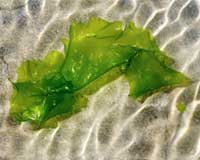 |
Buenos Aires (UPI) Mar 18, 2009 Micro-algae as a source of cheap renewable energy are at the center of new research being conducted at Argentina's National Technological University. The use of algae as a source of energy is being researched in different countries across the world and is at an advanced stage in the United States. But as research has grown so has the realization that converting algae into energy may not be as cost-effective as originally thought possible. As a result, new research and investigation has been two-pronged, both to make optimum use of algae as a source of energy and to do it cheaply. Scientists at the National Technological University of Mar del Plata, on Argentina's Atlantic coast, said they focused on developing techniques that would be both economically viable and environmentally sustainable. A production module already in place would seek to convert micro-algae into energy with the minimum amount of energy being used in the whole process. The scientists said they would seek to achieve a ratio below 1:5 -- to limit consumed energy to below 20 percent of the energy produced. A fundamental factor in the project is the replacement of high-cost raw materials, such as carbon dioxide and cultivation agents, with "environmental liabilities" like industrial waste and emissions and sewage mud, the university said. The research work is being conducted with the participation of scientists and technicians with an established knowledge base in aquaculture, biotechnology, environmental engineering and phycology, MercoPress reported. The production of biofuels, particularly biodiesel from marine micro-algae, has won support from environmentalists and politicians because it doesn't restrict human food consumption, as is the case with soybean and other agricultural crops, and fresh water is not used. Sea water cools the equipment deployed to convert micro-algae into energy. Analysts said it was too early to determine if energy produced from micro-algae could be cost-effective on a longer term and if the technology could be used for large volumes of energy. A hectare of micro-algae yields about 8,000 liters of bio-diesel. Argentina is reviewing its energy efficiency strategies amid a continuing economic downturn and changing demographics, with forecasts that the upwardly mobile younger generation, although environmentally conscientious, will be consuming more energy in the coming years because of changing lifestyles and improved living conditions. Argentina began exploring the micro-algae project in 2008. Scientists began the work with micro-algae species carrying high oil content. The micro-algae was cultivated in pools of up to 2,000 liters during the four seasons of the year, then collected in vats before being transported for processing.
Share This Article With Planet Earth
Related Links Bio Fuel Technology and Application News
 Agrilife Scientists Do Groundwork For Genetic Mapping Of Algae Biofuel Species
Agrilife Scientists Do Groundwork For Genetic Mapping Of Algae Biofuel SpeciesCollege Station TX (SPX) Mar 16, 2010 Using green algae to produce hydrocarbon oil for biofuel production is nothing new; nature has been doing so for hundreds of millions of years, according a Texas AgriLife Research scientist. "Oils from the green algae Botryococcus braunii can be readily detected in petroleum deposits and coal deposits suggesting that B. braunii has been a contributor to developing these deposits and may be ... read more |
|
| The content herein, unless otherwise known to be public domain, are Copyright 1995-2010 - SpaceDaily. AFP and UPI Wire Stories are copyright Agence France-Presse and United Press International. ESA Portal Reports are copyright European Space Agency. All NASA sourced material is public domain. Additional copyrights may apply in whole or part to other bona fide parties. Advertising does not imply endorsement,agreement or approval of any opinions, statements or information provided by SpaceDaily on any Web page published or hosted by SpaceDaily. Privacy Statement |